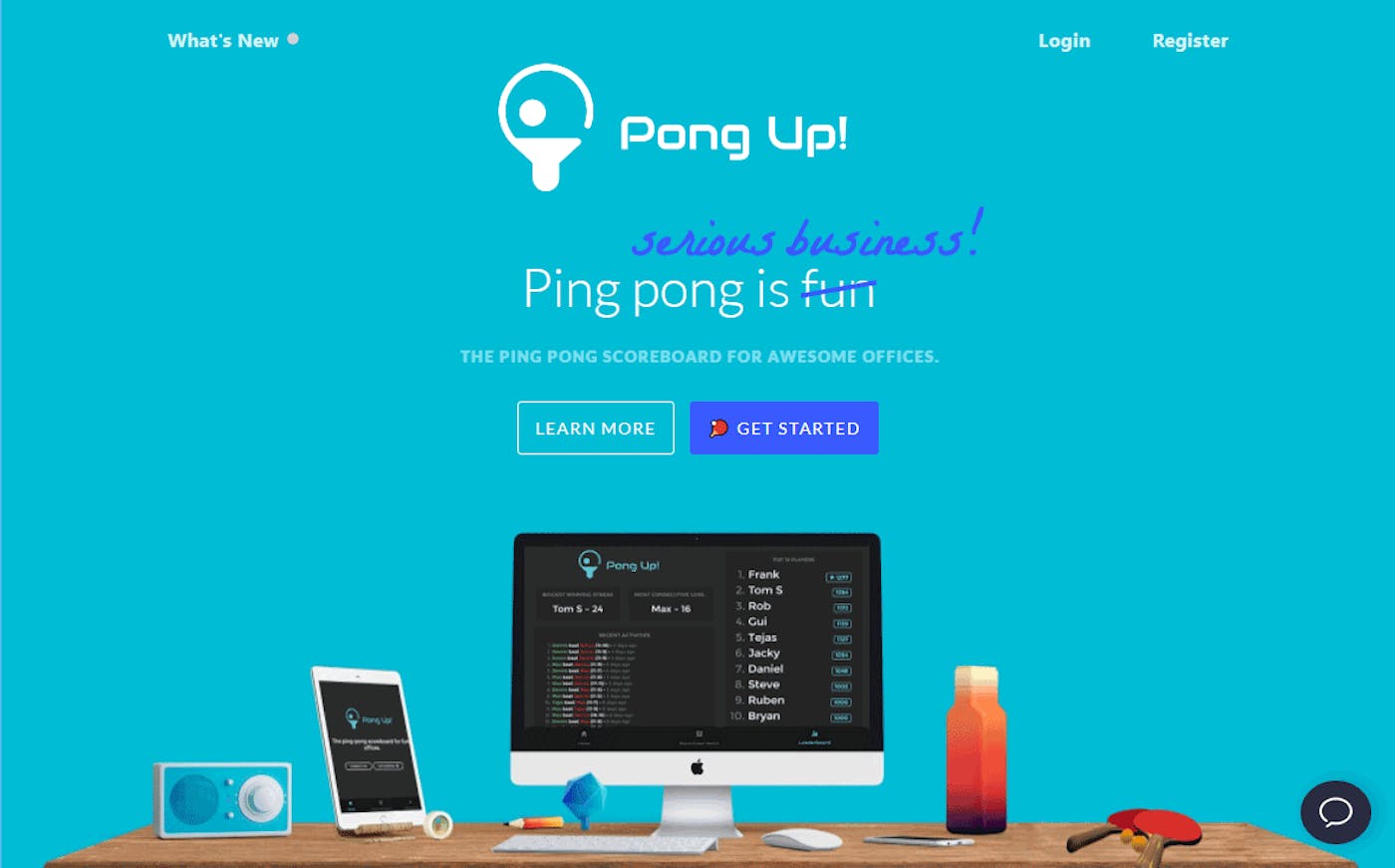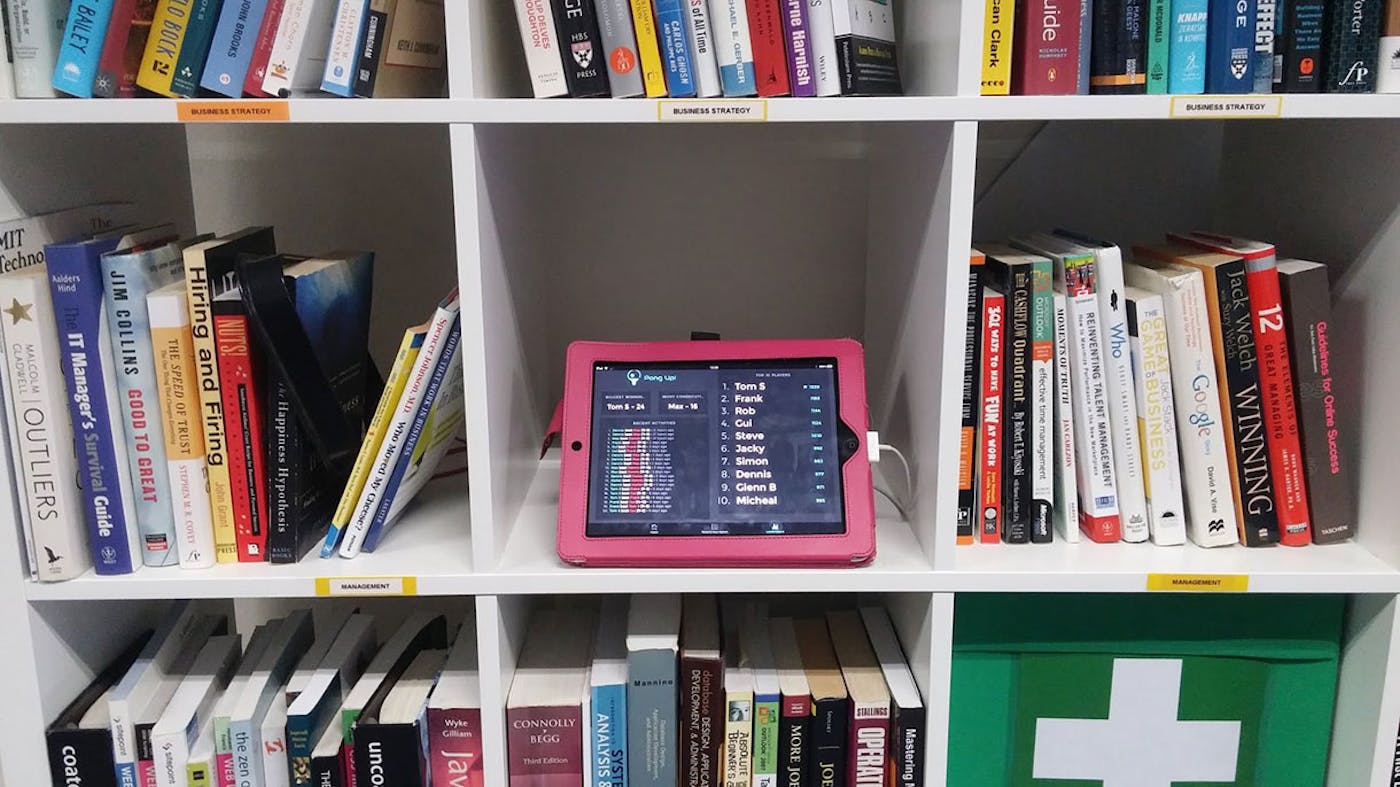Reaching $300/mo in the Fourth Month With a Fun Side
Project
Hello! What's your background, and what are you working on?
Hi! I'm Dennis, a web developer based in Sydney, Australia. I've always enjoyed building things on the side, from electronic projects to web and mobile apps. I'm currently working on PongUp! — a ping pong score tracker and leaderboard for fun offices.
Most workplaces nowadays have a ping pong or table tennis setup. It is one of those office perks that brings out the competitive nature in coworkers. PongUp is built to facilitate that — a system for players to reliably record their ping pong scores, work out rankings, and track their stats over time.
On top of that, PongUp is built with a focus on design from the beginning. This allows companies to deploy PongUp's dashboard on big TV screens or tablets in their ping pong area, as a nice addition to their office environment.
In the four months since launch, PongUp has tracked over 8,000 ping pong matches, and currently, the MRR is at $300.

What motivated you to get started with PongUp?
Along with many other tech offices, ping pong has always been competitive at our workplace. We were challenging one another throughout the day, mainly for bragging rights. One day among all our usual smack talks someone suggested that we should start tracking scores as a more reliable way to prove who's the better player. Of course! We did a quick search of what's out there, but couldn't find a solution that fit our needs.
I've been working on another larger side project at the time. Heeding the common advice that entrepreneurs should only focus on one thing at a time, I'd forced myself to ignore this idea for the time being. Turns out this advice is not always true, at least for my situation.
I would revisit this idea a few weeks later. Things were going slowly with my other project and I was losing motivation. At that point I was excited to just start something new, and PongUp seemed like a fun and contained project to build. It had even more brownie points for being something we would use internally in the office.
What went into building the initial product?
I was in a full-time job (and still am now) while working on PongUp. Time was really a constraint which forced me to be creative about what to include in the MVP.
I also wasn't sure if people would find the app useful, even within my workplace:
- Would people care to record their scores after every match?
- Would people get bored after the initial few days of excitement and stop using the app afterwards?
This presented a difficult dilemma: On one hand I didn't want to spend too much time producing a well-polished app before validating the idea. On the other hand, I'd be embarrassed to release a half-baked solution among my colleagues. (We're a web development agency that has high standards for our work quality after all.)
To get around this, I decided to avoid writing any code, and instead just used a Google Sheet with its attached Google Form to collect match outcomes. This way I wouldn't have to worry about any front-end design, user flows, or code quality, and I'd have an easy way to validate if such a tool would find any traction at all.
Eventually I started improving the Google Sheet slowly by adding formulas to calculate Elo points for each match and work out the rankings of each player. It was very motivating to see people recording matches in PongUp every day, even in its crude form.
Soon people start asking for the app to be deployed on a tablet in our ping pong area, and that's when I started building a proper front-end app (using Ionic) for PongUp.

We continued using this setup for the next 6 months, recording 722 matches within that period, all while still running Google Sheets on the backend to store all data and to perform all calculations.
Finally in March 2017, I started rebuilding the back end in Laravel with the goal of allowing other teams and offices around the world to also use PongUp, and to support further enhancements like Slack integration, which was highly requested.
If you're interested, that old spreadsheet can still be found here: https://goo.gl/5NK78p.
How have you attracted users and grown PongUp?
I'd decided to take a different approach with launching PongUp compared to my previous projects, which was to focus more on building traction pre-launch instead of just building and hoping for users to show up. This included:
- Putting up a landing page before writing the first line of back-end code
- Building up a mailing list pre-launch
- Reaching out to users pre-launch to work out features and pricing
- Launching on Product Hunt
- Continue spending time on marketing efforts even post launch
This focus on user feedback and building traction have paid off well so far, since PongUp has surpassed my other projects in both usage and growth.
An interesting growth hack I've experimented with has been to send personalized ping pong balls to early adopters who've signed up on the premium plan.
I take the time to customize each ball to match the company's color and branding, as well as to craft a personal welcome message for each attached postcard as a token of appreciation for their registration.
I've hoped for these customized balls to get some Twitter love and shares, which would help spread the word about PongUp. While this hasn't happened so far, users are still surprised and appreciative when this package arrives at their office. It's opened up the door for them to share their feedback with me and really helped in continuously improving the app.

What's your business model, and how have you grown your revenue?
PongUp has a free and plus tier. The free version is limited to 5 users and 50 matches per month, but otherwise has access to all features. I like this model because it gives users a chance to fully explore the app and only start paying if the app brings them value.
The plus tier costs $15 per month for the whole team, with unlimited players and matches.
So far, revenue growth has been steady with a pretty linear trend.
| Month | Revenue |
| March 2017 | 0 |
| April 2017 | 0 |
| May 2017 | 10 |
| June 2017 | 160 |
| July 2017 | 205 |
| August 2017 | 325 |
What are your goals for the future?
The main goal would be to continue building out features for my current user base so they get more value for their money. There are just so many things in the pipeline. The next feature that I'll be working on is having pretty graphs personalised for each player to show the player's point and rank changes over time.
In the longer term, I'm thinking of expanding horizontally to support other office games like foosball and console games (eg: FIFA, PES). The platform does already support these games to a certain extent. For example, we're already tracking our PES matches and ranks in PongUp. The challenge is more about how to tailor the marketing message for these different audiences.
Revenue-wise, I hope to hit $1,000 MRR within the next 6 months. To achieve this, I'll have to explore new marketing channels, and try to get better at measuring existing channels to understand their effectiveness. Still a lot to learn in this area!
What are the biggest challenges you've faced and obstacles you've overcome?
My biggest challenge so far has been balancing the addition of new features vs. spending time marketing the product.
I normally gravitate towards coding new features since it's what I'm good at, while marketing is still quite a painful effort. And don't think I have a solution to this yet. It's still a battle for me daily, but I've been trying to dedicate blocks of time towards each activity as a way to force myself to equally prioritize both areas.
I probably wouldn't do anything differently if given the chance. In fact I would take my learnings here and apply them to projects in the future — that is, to launch small and launch early, start getting feedback from users, and use it to drive the next set of features.
Have you found anything particularly helpful or advantageous?
I'm a member of Justin Jackson's Product People Club, and being in a community of product people that are focused on building and launching products has been really helpful. Especially as a solo developer. Having a place to bounce ideas and get help is invaluable. The Indie Hackers forum seems to be growing as well, and could be another good place to "hang out" online.
Another thing that's been very helpful is the chat widget that I've set up in PongUp. Although I rarely get to reply to the chat messages in real time (a downside of being in a different timezone than most of the world), I always make sure to follow up on all messages via email.
Those user questions have given me useful insights on what users thought, what features were popular, and if any part of the app was too confusing for new users. I've been able to continuously improve the app mostly based on this feedback.
I'm using small.chat for that since I like how it works with threads within Slack. It's also free, which makes it more attractive than alternatives like Intercom.
What's your advice for indie hackers who are just starting out?
It's still early in my journey, and I'm still learning, so I won't say I have all the answers. However, here are some things I've learned and found helpful:
- Start small. Very small. Keep your grand vision in mind, but break it down and build towards it iteratively. It's always about consistent small progress, rather than one big launch.
- Build a landing page first, even before writing any code. It forces you to think deeper about things like the pain point being addressed and who the target audience is. It's also a good source of motivation on those long days when you're knee deep building the project, giving you a glimpse of the end goal. Treat it just like your codebase, and iteratively improve it as you go.
- Your first project will most likely not bring a positive financial ROI. Yet, don't shy away from charging for your products (even if it's a very low price). You'll get so much more exposure to the non-technical side of building a product like marketing, copywriting and pricing, which you can apply to future projects.
- Dogfood your own product if possible. It brings a lot in terms of motivation, and makes sure you won't get bored of it too soon.
- Marketing is so much harder than coding. There's no "hello world" to get started, the outcomes are usually fuzzy and difficult to measure, and it's harder to "learn by doing", since you can't just work on toy problems to learn marketing skills.
Where can we go to learn more?
You can give PongUp a spin at getpongup.com, especially if you have a ping pong table at your workplace. You can also follow PongUp's Twitter account to receive updates on new features.
I'd love to hear your thoughts on the app, and if you have any questions at all please let me know in the comments below!

Nice idea! I had very similar to this one as we have a table football in the office.
something about this idea and the process above feels quite zen.
this is awesome - reminds me of a free tool i built (and still use, along with ~300+ others) called Pushup Metrics.
http://www.pushupmetrics.com/
we created it with a similar impetus... everyone at my coworking space in San Francisco was doing daily pushups on the roof at 3pm, and tracking them in a spreadsheet.
hacked this together in a day, then added SMS reminders, weather alerts(!), and the ability to 'text in' your score.
good stuff Dennis!
Great idea!
I tried signing up, but shows an error. Please can you check or it is deliberate and only for personal use?
hey! i just signed up a fake test account, and it worked OK.
i inputted a name / email / pass, and left mobile number blank. what did you try?
I tried with my mobile number.
Now, after your comment, I tried without the mobile number and it worked.
Thanks. Thanks for the quick comment too.
aha! fixing that now. :)
Thanks Ryan! Tracking push-ups is a good idea, that would surely motivate me to stick to doing it regularly. Just need a nice rooftop at work ...
For a while there I thought you had SMS and weather alerts baked into your spreadsheet, that would be a whole other level 😉